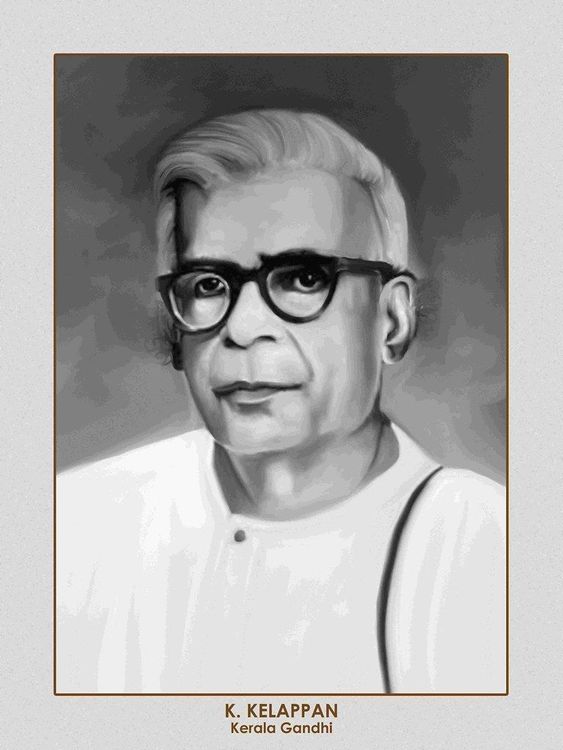For smooth Ad free experience
For smooth Ad free experience
While the British were overwhelmed with the presence of one Gandhi in colonial India, there was another man who was diligently working on Gandhian principles to defend his Motherland.

Born on 24th August 1889
During the Indian freedom struggle, when admiration for Gandhi and his ideals was at its peak, a man deep down in South, was executing Gandhian principles with a fervent belief. Rightly so, this man is popular as ‘Kerala Gandhi’.
Radically opposed to the unjust system of discrimination based on caste, he removed ‘Nair’ from his name which was representative of his caste, and came to be known as Koyapalli Kelappan or K.Kelappan.
It was during his college days that Kelappan developed an interest in social work. He was in Bombay studying Law when Gandhi gave a call for the boycott of British institutions and goods. Kelappan gave up his studies and decided that he would dedicate his life to the service of his Motherland. He actively participated in the Swadeshi Movement and promoted the setting up of Khadi and Village industries.
To protect his Motherland, Kelappan had to defend it from an external attack by the British as well as from its inherent and unjust social hierarchies.
He was committed to the cause of eradication of untouchability and worked for the upliftment of Harijans. Following Gandhi’s path, Kelappan set up several schools and hostels for Harijans in Kerala.
Carrying forward the principles of Gandhian values, he led several Satyagrahas regionally and was chosen by Mahatma Gandhi as the first Satyagrahi from Kerala in the individual Satyagraha movement launched by OG Gandhi. K.Kelappan played a major role in the famous Vaikom Satyagraha and led the Guruvayur Satyagraha, both aimed at an unrestricted temple entry for the depressed classes.
In 1931-32, to allow entry of untouchables in the Guruvayur Temple in the Thrissur district of Kerala, Kelappan went on a 12-day hunger strike. The fast was broken at the request of Mahatma Gandhi and the Indian National Congress. Gandhi hailed it as “the miracle of modern times” and “a smriti which is people’s charter of spiritual emancipation.”
When Samuthiri, the temple trustee, refused to adhere to the requests of the Satyagrahis, Kelappan and Manathu Padmanabhan started a fast unto death on 22 September 1932.
In an altercation between the Satyagrahis and those opposing it, A.K. Gopalan, a friend, and supporter of Kelappan was assaulted by the opposing forces. This ignited the rebels and they attempted a forceful entry into the temple which led to its provisional closure. Gandhi had to intervene yet again on October 2nd, and the struggle was withdrawn. According to Gandhi, Kelappan’s fast prompted a coercive character.
Kelappan had committed a few errors in the execution of the strike, according to Gandhi, who thus justified his intervention. Gandhi explained that a prior notice of the intentions of the Satyagrahis should have been handed out to the Zamorin or the temple guardians. Second, he told Kelappan that he should have consulted him before pulling off a fast, as Gandhi was an expert on such matters of fasting.
It was only in 1936, that seeds sown by Kelappan and others bore fruit when many temples in Kerala opened their gates to all irrespective of their caste as per the Temple Entry Proclamation issued by Maharaja of Travancore of 12 November 1936. The date is considered to be a milestone in the history of social reformation in Kerala.
Kelappan continued working for the society in the post-independence period as well and was instrumental in the unification of the State of Kerala. Championing the demand for a pan-Kerala geographical unit, Kelappan was against the formation of a Muslim majority Malappuram district. He argued that it will create a ‘mini Pakistan’.
He was an active member of politics until 1952 first as a member of the Indian National Congress, later followed by his membership of the Kisan Mazdoor Praja Party. After his time in politics, he became a Sarvodaya worker and associated himself with the Bhoodan movement of Kerala.
The commitment of Kelappan to serve the nation kept his fire burning. On his 132nd birth anniversary, we remember his efforts and endeavours to make Independent India a better place to live in.
0
You might be interested in reading more from
